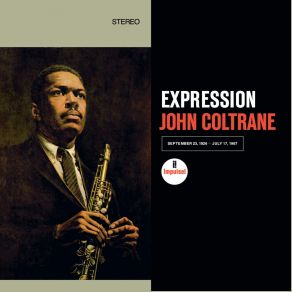Expression
Download links and information about Expression by John Coltrane. This album was released in 1967 and it belongs to Jazz, Avant Garde Jazz genres. It contains 4 tracks with total duration of 39:16 minutes.

|
|
|---|---|
| Artist: | John Coltrane |
| Release date: | 1967 |
| Genre: | Jazz, Avant Garde Jazz |
| Tracks: | 4 |
| Duration: | 39:16 |
| Buy it NOW at: | |
| Buy on iTunes $4.99 | |
| Buy on Amazon $4.99 | |
| Buy on Amazon $26.10 | |
| Buy on Amazon $12.59 | |
| Buy on Amazon $9.99 | |
Tracks
[Edit]| No. | Title | Length |
|---|---|---|
| 1. | Ogunde | 3:38 |
| 2. | To Be | 16:21 |
| 3. | Offering | 8:26 |
| 4. | Expression | 10:51 |
Details
[Edit]Recorded at two sessions in early 1967, Expression represents John Coltrane's final recording sessions just months before his death. A varied and searching record, Coltrane shares space with fellow universal travelers Pharoah Sanders, Jimmy Garrison, Rashied Ali, and wife Alice Coltrane. This band, working hard during the time leading up to Coltrane's demise, was performing in the most spiritually reaching territory Coltrane would aspire to. This is evidenced by the burning tenor/drum duet section of "Offering," perhaps the highlight of these sessions. Coltrane and Ali spiral into the far reaches here with a boundless energy that somehow remains controlled and restrained even in its rawest moments. The group succeeds in lifting the piece up to its highest peak and then setting it back down in a way so organic it feels almost ordained by a mass mind. The track, like all Coltrane at his best, becomes a guided meditation. The 16-minute vamp of "To Be" is perhaps the most quizzical and interesting piece here, finding Trane on flute, an instrument that he never gave much air time to on previous sessions. Coltrane trades gentle, lilting runs with Sanders' sometimes distant, sometimes atonal piccolo flute, stretching out into discordant waters somewhere in the middle of this lingering piece. Bedded by Alice Coltrane's brightly mystical piano clouds, the track would sound more at home on one of her solo albums than her husband's, but denotes their mingling inspirations. At the time these sessions were put to tape, Coltrane had been silently suffering from undiagnosed liver cancer for some while. His death was a shock to many in the jazz community who had no idea he was even sick, let alone nearing the end. It's remarkable that Expression is not some world-weary harbinger of death and sickness, but an endlessly jubilant affair. Even in what must have been a time of tremendous pain and darkness, Coltrane's single-minded quest for understanding and transcendence took him to places of new exploration and light. [Some issues of Expression include final track "Number One," a nearly 12-minute surge of raw, rolling interplay between Coltrane's tenor and Sanders' upper-register woodwinds.]